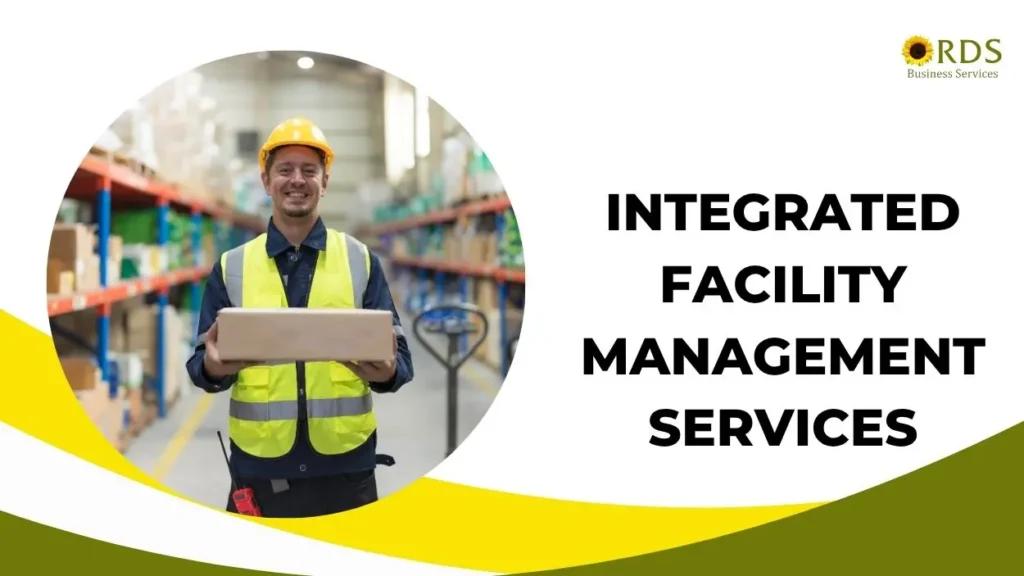
Table of Contents
Integrated Facility Management (IFM) is becoming the core strategy for businesses that want to reduce operational costs, improve productivity, and manage multiple facility functions under one unified system. Instead of working with separate vendors for housekeeping, maintenance, security, and technical services, IFM brings everything together under a single integrated model. This not only simplifies operations but also ensures higher efficiency, better compliance, and improved asset performance. In this guide, we explore how integrated facility management services work, their benefits, latest trends, and why organizations across India rely on IFM to streamline operations.
RDS Business Services delivers professional IFM services across Hyderabad, Chennai, and Bangalore, helping organizations optimize facility performance through centralized management.
1. What Is Integrated Facility Management (IFM)?
Integrated Facility Management (IFM) refers to the centralization of all facility-related operations under a single provider. Instead of managing multiple vendors for maintenance, cleaning, security, and technical services, businesses rely on one partner who oversees everything.
This integrated approach improves visibility, reduces operational complexity, and ensures consistent performance across all facility services.
How IFM Works
A professional IFM model includes:
- Centralized command and control for all facility operations
- Preventive & predictive maintenance to minimize downtime
- Digital monitoring tools such as CAFM, IoT sensors, and analytics dashboards
- Unified reporting and compliance management
- One dedicated team managing all soft and hard services
By consolidating services, organizations gain higher efficiency, streamlined workflows, and lower operational costs.
2. Why Businesses Choose Integrated Facility Management Services
Organizations across industries choose IFM because it provides:
Better Facility Maintenance
- Preventive, scheduled, and reactive maintenance
- Faster issue resolution
- Reduced breakdowns and downtime
Higher Efficiency Compared to Traditional FM
Traditional FM separates services.
IFM unifies them enabling:
- Smooth communication
- Faster decision-making
- Centralized vendor management
Optimized Maintenance Services
With one team managing all assets, organizations benefit from:
- Standardized procedures
- Consistent service delivery
- Lower maintenance costs
Cost Efficiency
IFM reduces:
- Vendor management overhead
- Operational wastage
- Administration expenses
- Emergency repair costs
Enhanced Customer and Employee Experience
Clean, well-managed, safe facilities improve:
- Visitor satisfaction
- Employee productivity
- Occupancy rates
Compliance and Risk Management
IFM partners like RDS ensure:
- Reduced accident risks
- Safety compliance
- Environmental standards adherence
3. Core Components of Integrated Facility Management Services
A robust IFM model includes:
Soft Services
- Housekeeping
- Waste management
- Front office management
- Pest control
- Landscaping & horticulture
- Pantry services
Read: The Complete Guide to Housekeeping Services
Hard Services
- Electrical, plumbing, and civil works
- HVAC operations
- DG set & transformer maintenance
- Fire safety system management
- Asset lifecycle management
- Energy management
Read : Engineering services
Specialized Services
- Security services
- Vendor management
- Space planning
- Sustainability solutions
This comprehensive structure is what makes IFM more effective than traditional facility management.
4. How Integrated Facility Management Solutions Enhance Productivity
Centralized Operations Boost Efficiency
With all services managed under one system, duplication is eliminated and workflows become smoother.
Data-Driven Decisions with Analytics
Modern IFM uses:
- IoT sensors
- CAFM software
- Real-time dashboards
This helps managers identify issues early and optimize operations.
Preventive Maintenance Reduces Downtime
Scheduled inspections and predictive maintenance ensure:
- Lower equipment failure
- Longer asset lifespan
- Better service reliability
Stronger Team Coordination
Centralized communication ensures:
- Faster response
- Clear accountability
- Better task tracking
Optimized Labor & Resource Use
IFM improves resource allocation by identifying:
- Underutilized manpower
- Wastage points
- Maintenance inefficiencies
Improved Customer Satisfaction
A well-managed facility improves:
- Productivity
- Tenant retention
- Overall experience
5. Latest Trends in Integrated Facility Management (2025)
The IFM industry is evolving with automation, sustainability, and real-time analytics. Key trends include:
- Smart building automation using IoT and AI for maintenance tracking
- Data-driven decision-making through facility analytics dashboards
- Eco-friendly facility operations optimization for sustainability goals
- Cloud-based CAFM systems for monitoring maintenance remotely
Partnering with a professional integrated facility management company like RDS Business Services allows organizations to adopt these innovations seamlessly while maintaining compliance and cost control.
Benefits of Streamlining Operations Through Integrated Facilities Management (IFM)
Streamlining operations through Integrated Facility Management (IFM) delivers measurable improvements across performance, cost efficiency, compliance, sustainability, and asset care. By centralizing facility operations under one integrated model, organizations gain stronger control, better visibility, and long-term operational stability.
1. Clear Metrics for Measuring IFM Performance
Integrated facilities management provides access to performance dashboards, KPIs, and real-time metrics that help organizations measure:
- Asset uptime
- Response and resolution time
- Cost per service
- Energy consumption
- Preventive vs. reactive maintenance ratio
These insights support data-driven decision-making and help facility managers optimize resources more effectively.
2. Reduced Downtime Through Preventive Maintenance
IFM significantly reduces downtime by implementing:
- Scheduled inspections
- Preventive maintenance programs
- Predictive analytics for asset failures
With fewer breakdowns and faster issue resolution, organizations experience improved reliability and higher operational continuity.
3. Cost Savings Through Integrated Operations
An integrated approach eliminates operational silos and reduces cost leakages by:
- Optimizing manpower and resource usage
- Reducing emergency/last-minute repair expenses
- Streamlining procurement under a single vendor
- Lowering administrative and vendor management costs
This leads to substantial long-term cost savings while maintaining high-quality service delivery.
4. Enhanced Compliance and Risk Management
IFM partners ensure adherence to:
- Fire safety norms
- Environmental regulations
- Health and hygiene standards
- Statutory and regulatory requirements
Centralized documentation and automated compliance reporting help reduce risks and avoid costly penalties.
5. Improved Sustainability and Environmental Impact
Integrated facilities management helps businesses achieve sustainability goals by:
- Monitoring energy, water, and waste consumption
- Optimizing HVAC and electrical systems
- Implementing green building practices
- Reducing carbon footprint
This not only minimizes environmental impact but also reduces operational costs.
6. Higher Productivity and Employee Satisfaction
A clean, safe, and well-maintained facility contributes directly to:
- Improved employee morale
- Fewer workplace disruptions
- Higher productivity
- Better visitor and tenant experience
Efficient facility operations create a comfortable environment that supports daily business activities.
7. Increased Asset Lifespan and Long-Term Value
IFM maximizes asset value through:
- Consistent maintenance
- Early identification of issues
- Proper asset documentation and lifecycle management
This ensures assets perform at their best, last longer, and generate a higher return on investment..
7. IFM as a Cost-Effective Outsourcing Solution
Outsourcing facility management to a single integrated provider helps organizations:
- Avoid managing multiple vendors
- Reduce administrative workload
- Reduce payroll costs
- Improve service quality
- Get specialized expertise across all facility functions
IFM is one of the fastest ways to lower facility management costs without compromising service levels.
8. Enhancing Operational Agility with RDS Business Services
RDS Business Services helps organizations achieve operational agility by:
- Centralizing service delivery
- Offering trained facility management professionals
- Implementing smart maintenance strategies
- Using technology-driven solutions
Businesses can focus on core operations while RDS manages the entire facility ecosystem.
9. Why Choose RDS Business Services for IFM
RDS provides:
- Customized IFM solutions tailored to business needs
- Highly trained soft and hard services teams
- Proven operational frameworks
- Technology-enabled facility management
- Strong compliance and safety systems
Whether you manage a corporate office, industrial facility, or commercial property, RDS ensures smooth, professional, and efficient facility operations.
10. Cost Reduction Through IFM with RDS
RDS helps businesses reduce costs through:
- Preventive maintenance programs
- Smart energy management
- Optimized manpower deployment
- Reduced vendor management costs
- Streamlined procurement
This results in long-term financial stability and improved operational performance.
11. Get Started with RDS Business Services Today
Ready to optimize your facility operations with a reliable IFM partner?
RDS Business Services offers end-to-end integrated facility management services designed to improve efficiency, reduce costs, and enhance performance.
Contact RDS Business Services today for a customized IFM plan.
FAQ
What are integrated facility management services?
IFM is the unified management of all facility-related services including housekeeping, maintenance, security, and technical services under a single provider..
What is the meaning of IFM services?
IFM combines both soft and hard services into one integrated solution to reduce costs, improve efficiency, and streamline operations.
How does an IFM work?
IFM centralizes all services through one provider, supported by technology such as CAFM and IoT systems for real-time monitoring and performance tracking.
What are the benefits of IFM?
Key benefits include cost efficiency, better compliance, improved productivity, enhanced service quality, and longer asset lifespan.







